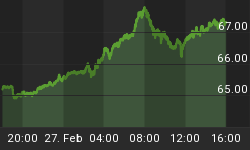Even cowboys get the blues
Stamp increase tells a bigger story
Americans still hitting the housing ATM machine.
The bulls are on a roll.
The Dow Jones tacked on 65 point today, but the S&P 500 and Nasdaq were up even more on a percentage basis. The Dow Jones was up by 0.6%, but the S&P and Nasdaq were up by 1.0% and 1.4% respectively.
The gains were pretty widespread. Advancers outnumbered decliners by 74% to 21% and 169 stocks hit new 52-week highs compared to 95 new lows. Those are solid numbers showing widespread participation.
Long-bonds continued to fall with the yield on the 30-year Treasury bond rising from 4.77% to 4.80%.
Even oil is cooperating, staying below $60 at $59.70.
Even though I doubt it will last very long, it does appear to me that the bulls have taken control for the time being.
Trio of software warnings. Anybody that is invested in software companies that cater to the corporate market got a loud wake up call today that they are invested in the wrong business.
Warning #1: Mercury Interactive, a maker of software used to test and analyze the performance of corporate Internet-based applications, got clobbered for a 26% loss after reporting that it reported that its CEO and CFO were caught lining their personal pockets by improperly granting themselves a mountain of stock options.
Warning #2: Security software company Symantec (Nasdaq:SYMC) dropped by 19% after issuing a disappointing Q3 profit report, warned about Q4 and the resignation of CFO Grey Myers.
Warning #3: McAfee (NYSE:MFE), another security software developer, lost 10% of its value after it gave a disappointing forecast for the rest of the year.
What this trio of software warnings tells me is that corporate America is unwilling to write any big checks for new software applications.
It also makes me question whether corporate America will cut back on other capital investments. If so, there are all sorts of negative implications and earnings shortfalls yet to be reported.
Even cowboys get the blues. I love the city of Denver. The weather is great, the scenery is beautiful, and it has managed to retain an important part of its old west charm while becoming one of our country's great major metropolitan cities.
Warning: Denver is showing signs of economic stress. According to the Metro Denver Economic Development Corporation, the Denver economic engine is sputtering.
Only seven of the 18 economic indicators it tracks improved last month. Not only are 11 of those key measures negative, the trend is worsening. Last month, 11 of the 18 last month were positive.
Most notable was the discouraging real estate numbers. In October, the house sales were up a measly 0.8% higher and the number of homes for sale is 12.4% higher than the same period last year.
I wouldn't go so far as to say that Denver is a microcosm of the U.S. economy, but it is one of the most vibrant, fastest growing, and most desirable cities to live in for the country. If Denver is struggling, it makes me wonder how the rest of the country is doing. Think about it.
Stamp increase tells a bigger story. While I think the cost of a first-class stamp is one of the greatest bargains on earth, there is no doubt that rising postage costs have an important affect the bottom line of American businesses.
The Postal Rate Commission approved an increase in the price of a first-class stamp by 2 cents to 39 cents. The price increase, if approved by Postal Service Board of Governors, will take effect in January.
The Postal Service is just like any other shipper and is affected by rising energy prices.
The reason this price increase is important news is that it should tell you to expect similar increases from other transportation companies, like UPS, Federal Express, Yellow Roadway, CNF, J.B. Hunt, CSX, Union Pacific, Laidlaw, and American Commercial Lines (the largest Mississippi River barge operator).
By the way, the last time postage rates were raised was in June 2002.
Americans still hitting the housing ATM machine. According to Freddie Mac, American homeowners are yanking money out of their home equity in record amounts.
Freddie Mac estimates that the dollar amount of home equity being pulled out of homes will increase from $142 billion in 2004 to more than $204 billion this year.
In just the last quarter, 72% of refinances resulted in new mortgages with loan amounts that were at least 5% higher than the original mortgage.
At the same time, the cost of borrowing all that money is growing up. Freddie Mac reported that the median ratio of old-to-new interest rate was 1.09, which means that all refinances resulted in a new interest rate that was 9% higher than the old mortgage.
After 12 interest rate hikes and promises of more to come, the cost of all this borrowing is going to rise even more. At what point do debt-strapped Americans cry "uncle?" That's impossible to say, but I believe the answer is pretty darn soon.















